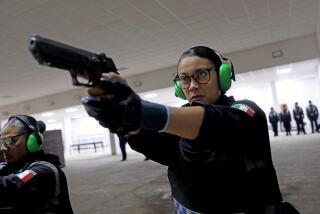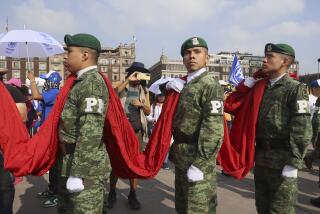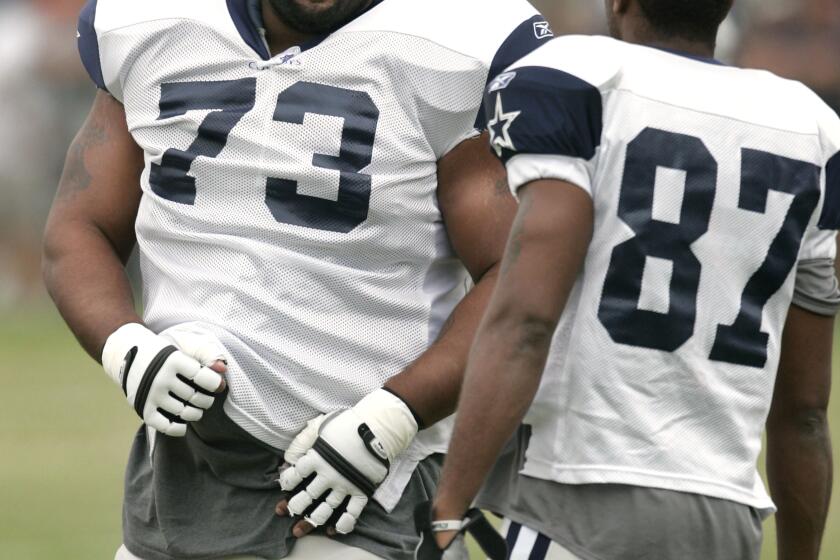NATO Moves to Secure Kosovo
Peace came lumberingly, noisily and poignantly to Kosovo on Saturday as what appeared to be endless convoys of thundering tanks and heavily armored vehicles inched across the border to clear and secure the two-lane road leading to the provincial capital, Pristina.
KFOR, as the international peacekeeping force for the Serbian province is known, got off to a roaring start about 5:30 a.m., but its advance became a crawl and sometimes a complete stop not long after, as the troops found ghost towns riddled with booby traps, tunnels laden with mines and even gun-toting members of the rebel Kosovo Liberation Army.
The first contingent of American soldiers--an element of the 1st Infantry Division on a mission to set up communications for the commander of U.S. forces--entered Kosovo several hours after the first units of peacekeepers had arrived.
All in all, the first day of NATO’s mission in Kosovo was filled with exhilaration for the Kosovo Albanians and moments both amazing and surreal.
It was marred chiefly by the continuing presence of about 200 Russian troops from Bosnia-Herzegovina that had managed to reconnoiter at the Pristina airport early Saturday.
A lone, weathered refugee, Shaban Bela, 65, his white skullcap contrasting with his deeply bronzed, leathery skin, crossed back to his homeland at the border with Macedonia carrying only a new pair of shoes and a bag. Once past the gatehouse, he climbed aboard an allied tank and flashed a V-for-victory sign.
Crowds of refugee children, housed in two sprawling tent cities near the Macedonian border, clapped and chanted “NATO! NATO!” as each of hundreds of vehicles, from tanks to armored troop carriers, passed.
The singsong sounded more like “Knot-to,” but it boosted soldiers’ morale nonetheless. Some kids threw the red poppies that grow wild in the fields lining the road.
It was the first time many of the troops had seen the refugees, whose repatriation is the main reason they are here. Some soldiers could be seen dabbing away tears as they sat atop their tanks; at least one took out a camera and snapped a photo.
“It’s nice to know you’re appreciated,” said one.
By nightfall, about 6,000 mostly British soldiers had moved into the territory, and NATO commander British Lt. Gen. Mike Jackson, after arriving by chopper at Pristina’s airport, had taken command in Kosovo.
The Western troops who entered Kosovo on Saturday were the vanguard of up to 50,000 peacekeepers whose deployment Yugoslav President Slobodan Milosevic finally agreed to Thursday after 11 weeks of punishing airstrikes by the North Atlantic Treaty Organization.
Milosevic, whose forces conducted a vicious campaign of “ethnic cleansing” against the province’s ethnic Albanian majority both before and during the air war, also agreed that his 40,000 or so troops would withdraw. As of late Friday, NATO said, about 10,000 Serbian police and soldiers had left, along with 11 MIG-29s.
U.S. forces, which up to now have been providing support for soldiers from other nations, will start moving in larger numbers into Kosovo today, Gen. Henry H. Shelton, chairman of the Joint Chiefs of Staff, said in Washington. The American presence will include four mobile infantry battalions, one artillery battalion, two engineer battalions, military police and an aviation task force.
Among the first U.S. peacekeepers to move into the province will be members of the 26th Marine Expeditionary Unit. About 7,000 American troops are destined to participate in Operation Joint Guardian.
In Pristina, NATO’s arrival continued to be overshadowed by the earlier, unexpected entry of Russian troops Saturday. The Russians, traditional Yugoslav allies, are demanding a separate peacekeeping zone of their own within the province, but the alliance strongly opposes the notion.
Jackson downplayed the incident to reporters, saying he “welcomed” the Russians as part of KFOR. Still, what one military official described as a “cordial” meeting between British and Russian officials at Pristina’s airport was described as “tense” by a British pool reporter.
Late Saturday, how the Russians and NATO will cooperate in Kosovo remained unclear. In Moscow, talks on the issue between Deputy Secretary of State Strobe Talbott and Russian officials ended inconclusively.
For his part, President Clinton offered to join with Russia to ensure peace.
“We are working now with the Russians to assure that we can work together in the unified command structure,” the president told members of the Illinois Air National Guard at O’Hare International Airport in Chicago, observing that such a structure is functioning with U.S. and Russian cooperation in Bosnia-Herzegovina, the Balkan nation whose 3 1/2-year war ended in 1995.
“This is important,” the president said, vowing to protect Serbs and ethnic Albanians alike in Kosovo.
An administration spokesman said Clinton planned to speak by telephone today with Russian President Boris N. Yeltsin, in his fourth conversation with Yeltsin about Kosovo in recent days.
Top U.S. defense officials said they accepted the presence of the Russian troops in Kosovo, but they, too, downplayed the military significance of the attention-grabbing maneuver by the Russians.
“There’s no particular glory in arriving in Pristina with 200 troops, stating that you’re first,” Defense Secretary William S. Cohen said at a Pentagon news briefing. “That’s not the essence of what this peacekeeping mission is all about.”
Shelton added that NATO troops do not expect interference from the Russians as they go about the task of establishing control: clearing mines, assisting the homeless civilians who roam Kosovo, preventing violence between ethnic Albanians and Serbs and preparing the way for the eventual resettlement of nearly 1 million refugees.
In other developments Saturday:
* U.N. Secretary-General Kofi Annan announced the appointment of Sergio Vieira de Mello as his special representative in Kosovo on an interim basis. De Mello, 51, of Brazil will hold the top civilian post in the province and will, in essence, act as its de facto governor--coordinating closely with NATO’s top generals and a host of humanitarian agencies. As the U.N.’s undersecretary-general for humanitarian affairs and its emergency relief coordinator, he headed an assessment mission to Kosovo and Yugoslavia last month, returning to brief the Security Council about the dimensions of the crisis.
* About 1,200 soldiers from a German battle group were camped out on the outskirts of Kukes, Albania, and were scheduled to open the way back to Kosovo from Albania today. Lt. Col. Wolfgang Schraut, commander of a reinforced light infantry battalion, said he expected Serbian soldiers to meet the NATO troops at the border and withdraw in front of them to the town of Prizren.
Having crossed the Macedonian border into Kosovo, meanwhile, refugee Arinit Sheha kissed the ground when he returned to his country. Words were insufficient to describe his happiness, he said. “I’d need to be a poet.
“It’s like getting beat up by a bully,” Sheha went on, “then coming back and saying, ‘I’ve got my big brother to get you.’ ”
All day Saturday, giant Chinook cargo choppers roared overhead, loaded with supplies and soldiers, Land Rovers and other gear swinging from their underbellies. At times, the valley nestled amid lonely mountains was transformed into a helicopter highway.
As the day wore on, the second of two British brigades used Challenger I battle tanks, Warrior armored personnel carriers and Scimitar reconnaissance vehicles to enter Kosovo by land en route to Pristina.
According to French army Lt. Col. Jack Allamassey, the entry of French forces through Kumanovo, Macedonia, stalled when soldiers discovered land mines inside the Kosovo border and had to remove them.
The first American troops crossed the border early Saturday afternoon. The soldiers planned to set up radio equipment, maps and battle tracking boards to pave the way for Brig. Gen. John Craddock, commander of the U.S. forces participating in the KFOR operation, to communicate with his troops.
“We’re pretty much excited, but we’re a little concerned because of the land mine situation,” said Los Angeles native Toma Kim, a second lieutenant with the Parachute Infantry Regiment, part of the 82nd Airborne Division. “But other than that, we’re prepared. We know what we’re doing.”
Land mines and booby traps were among the more sinister elements found by the elite Nepalese soldiers in the Royal Gurkha infantry division who were among the first British units to cross into Kosovo.
The first town over the border, named Hani.I.Elezit, was eerily deserted as troops pulled in early Saturday.
A single bullet hole had pierced the window of the Drita grocery store. Most sinisterly, the Gurkhas had spotted a booby trap: There was a small “boom box” radio set atop a counter in a store with all of its windows broken.
A closer look, however, revealed that a thin copper wire the width of a fishing line was rigged both to the device and to the side of the building. Touching it could trigger an explosion, the Gurkhas said.
The Gurkhas found several other small land mines along just the first few miles of the road. One was in a small bandage box near the roadside, a box that wouldn’t be visible after dark.
Just across the border in Blace, Macedonia, Dennis McNamara, the U.N. refugee agency’s special envoy for the former Yugoslavia and Albania, surveyed the military scene in preparation for a humanitarian convoy he plans to lead into Kosovo today--the first of its kind since the NATO bombing began March 24.
Fifty vehicles carrying 250 tons of food and supplies are to aid what are believed to be tens of thousands of internally displaced people in the province. While the convoy’s mission is clear, what remains to be seen is whether the throngs of Kosovo refugees housed in camps in Macedonia and Albania will wait until relief workers are ready for them to return home.
*
Times staff writers Julie Tamaki in Skopje, Macedonia, Marjorie Miller in Kukes, James Gerstenzang in Chicago, Ricardo Alonso-Zaldivar in Washington and John J. Goldman at the United Nations contributed to this report.
More to Read
More to Read
More to Read
Start your day right
Sign up for Essential California for news, features and recommendations from the L.A. Times and beyond in your inbox six days a week.
You may occasionally receive promotional content from the Los Angeles Times.




